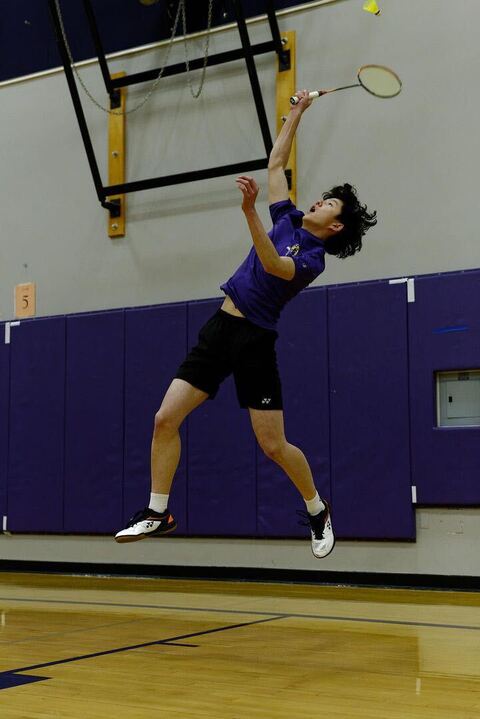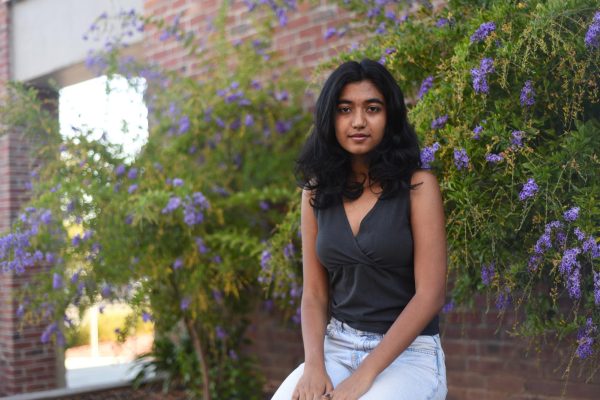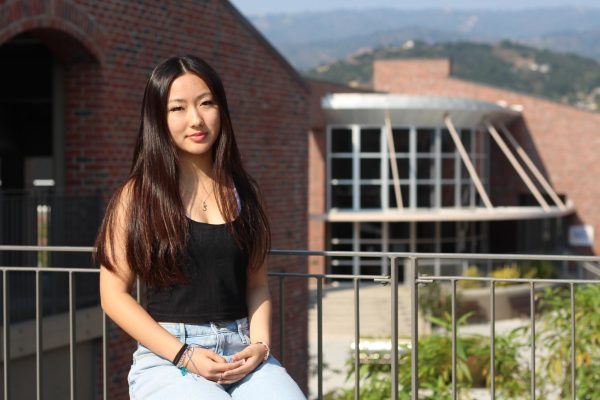Time out! Ep. 6: Lance Fuchia
Following Lance Fuchia’s success in badminton
June 3, 2023
SZ: Hi everyone, my name is Stephanie Zhang.
TS: And my name is Trisha Sannappanavar.
SZ: Welcome to Episode 6 of Time Out! Each episode, we will be diving into the sports scene here at Monta Vista High School and explore the journeys of athletes from various sports. In this episode, we are joined by senior Lance Fuchia, who placed fifth in the nation for badminton in 2021. Let’s dive more into his badminton journey!
TS: When did you start playing badminton?
LF: I started playing when I was eight or nine. I started playing with my parents in the backyard. And then from there, I thought I really enjoyed it so I decided to [go to] classes and stuff like that.
TS: Was there anything that influenced you or impacted you to start [playing] badminton?
LF: I think both my parents were avid enjoyers of the sport, [so] they used to play recreationally for their college teams. I think that they introduced me to the sport and then sparked my passion for it.
TS: Can you describe one of those memories?
LF: I think it was [around] when I was seven or eight when I first started. My parents obviously have [a lot] more experience than me. So, when they used to play in the backyard for fun or to exercise, they would ask me to join them. And then from there, I thought the sport was really interesting. As I grew older, I started to play more. I was able to not only learn from them, but I was able to become a better [player] than them.
TS: How have they supported you throughout your badminton career?
LF: They supported me both financially and emotionally. They encouraged me to go to practice, and my mom, she was really strict on me. She ensured that I’m disciplined when I’m training and that I attend all the sessions during tournaments. When I don’t perform my best, she gets mad at me because she cares so much. In terms of my dad, he allocates a certain amount of money [for] funding [my] tournaments, traveling to a different part of the country, [buying] plane tickets and obviously the practices. So I mean, both financially and emotionally, they both care a lot, and that’s why they are willing to sacrifice to help me improve as a player.
TS: Is there one specific memory where they supported you emotionally that you remember and that’s impactful?
LF: I mean, I think definitely one big one was when I was 14 or 15, and I was having a pretty bad year in terms of the rankings for tournaments. I wasn’t playing as well as I had initially envisioned. And so instead of getting mad at me or losing hope for me, my parents and I, over winter break, traveled to China so I could train with all the good players there.
TS: How has badminton impacted your life outside of the game?
LF: It’s definitely helped me mature as a person and as a competitor in all aspects of life. I understand the value of hard work, perseverance and the value of not giving up.
TS: Has there ever been a moment that you wanted to give up?
LF: I’ve definitely wanted to give up multiple times in my career, and then I did eventually give up competitive badminton to focus more on my schoolwork. But there were definitely periods of time after tough losses, where I impulsively wanted more and more to quit the sport because of how frustrating it is to give your 100% and still not succeed.
TS: How did you push through that and still motivate yourself to keep playing?
LF: I think part of that is the competitiveness that I have and the drive to win. [Also] how I don’t want to be known as someone that just gave up because he couldn’t succeed. In addition, I also have my parent’s support. If they had told me that I should give up, I probably would have. But, my parents kept motivating me and telling me that you know, one loss doesn’t define you. Just keep going and persevering.
TS: Has that mentality also stuck with you in everything else you’ve done?
LF: Yeah, definitely. I don’t think I’ve been as successful in other aspects of my life than I’ve been in badminton, but the mentality of adapting and keeping a personal goal stays with me. I think that it has applied to things like schoolwork, friendships, applying to college and stuff like that.
TS: Has badminton ever helped you form friendships?
LF: Yeah. I’m really tight with and have pretty close bonds with all the members of the badminton community right now. I think I’ve developed multiple lifelong friends and connections with the community in the sport.
TS: What’s a favorite moment you had? Like, a favorite game or just a memory you’ve had?
LF: My favorite memory was definitely in 2021, because — it’s kind of a long story — in 2019 and 2018, I wasn’t really performing as well as I initially expected. I was struggling and was dropping in the rankings. I was struggling in almost every tournament, losing early, and really contemplating quitting. But then in 2021, COVID hit, so obviously there were no tournaments for a year and a half. I made sure to take advantage of that year and a half. A lot of people didn’t exercise and slacked off. But for me, I made sure that I ran at the Kennedy track every day, I practiced at home and I practiced against my parents, so I was able to improve while others just kind of got worse or stayed the same. And it’s really rewarding to see my hard work and perseverance finally paying off. Despite all the years of struggling, at the first tournament back from COVID, I was able to achieve the best results that I’ve gotten in my career. So I think that was really rewarding that after all the years I was finally able to break free from the barriers I was facing.
TS: How do you personally feel about your accomplishments?
LF: I’m definitely proud and satisfied [with] what I’ve done, but I also do have some regrets where I think that I could have been better or maybe if I had worked harder during this one period of time. If I had focused more on my running or if I had just sacrificed a bit more, maybe I could have achieved better results than I have gotten. But ultimately, I think I’m pretty happy with what I’ve accomplished given that I’m relatively young compared to all the other players in my age group, and everyone else is a lot bigger and taller than me, so I’m pretty proud of what I’ve accomplished.
TS: How do you personally feel you push past the regrets and how do you use those regrets to motivate yourself?
LF: The feeling of loss is a feeling that I really hate, and I hate knowing that someone else outworked me, that they were able to dedicate so much time and that there was someone that worked harder than me and dedicated more than me. So, just the feeling of my past losses. I just try to remember how it felt to lose a game I really cared a lot about. And that motivates me to train harder because I just tell myself that I never want to have that feeling again. I want to make sure that I’m the one that’s celebrating after a match and not the one that’s looking back and having regrets.
TS: How do you deal with the pressure of badminton and wanting to be good?
LF: I think for me, I think in terms of pressure, I don’t really believe that I’d been pressured and I believe that having too much pressure during the match is a sign of a lack of confidence. I just know that for me, especially when I play the school team, I know that — I mean not in an egotistical way [but], I know that I train longer than everyone and have more experience than everyone else. So in terms of school badminton, I just don’t feel any pressure either because I just feel confident that I have more experience and am kind of a better player than everyone I was playing against, but in terms of the competitive scene, I think that I definitely do feel pressure knowing that everyone, there has been playing as long as me. They’re as experienced as me, but [I just told] myself, the worst case scenario is that I try my best not to lose and at that point, there’s really nothing else I could have done about it. So I think that I just kind of told myself that whether I win or lose, it really doesn’t matter as much as I think it will, my life is gonna end up the exact same whether or not I win the match. That’s why I just try to downplay the stakes of a match to reduce the pressure I’m feeling.
TS: How has being part of Monta Vistas’ badminton team [helped] boost your confidence?
LF: It definitely does boost my confidence because it’s obviously a drastic change compared to the competitive scene. Because the kind of scene I’m playing against guys that are national champions — they’re trained in Asian countries and they came to the US to play and then all of a sudden I go to the Monta Vista matches and I play against some guy that started last week. So I think that also being on the school team has taught me a lot about leadership because the competitive scene is all about winning. If you don’t win, [you are seen as] a failure to a lot of parents and a lot of the players and then everyone’s just focusing on being as good as [they can be], you know, it’s really [an] individualistic perspective, how the main focus is just placing as high as you can, get the high ranking you can. But in the team [the goal] for me since I’m the captain, the goal for me is having the team do as well as having a team achieve as much success as possible, not having me myself achieve as much success as possible. So it’s really taught me that [I] have to not just focus on winning myself. I teach other players how to win, then make sure my efforts kind of go to the entire team and not just myself.
TS: How do you balance schoolwork and playing badminton? Is badminton something you’d like to pursue in the future?
LF: I quit playing competitively to focus on my schoolwork and [extracurriculars] two years ago, but I still do play for fun when I go on the school team. I just don’t compete in national tournaments anymore. So I believe that in the future, I definitely want to keep playing for my college teams just for fun, and I don’t really plan on playing any more tournaments. But balancing school and badminton, I think it’s definitely an extremely tough challenge. Especially if you’re trying to become one of the best players in the nation in badminton, which takes probably five or six practices a week, and three to four hours each practice. That’s extremely hard to balance [while also] trying to maintain a 4.0 GPA, trying to get high, test scores and all that stuff. So I think that I’m not the best at managing because I did end up choosing between school and badminton and I ended up choosing school. So I think that’s definitely a hard challenge.
TS: Do you miss playing competitively?
LF: I mean, I definitely enjoyed those moments I look back on and I wish I could kind of relive it again, the adrenaline that I feel while winning, you know, the crowd that’s watching everyone. Just kind of the feeling of playing competitively, it was a good feeling, but [ultimately] I think I did make the right decision in choosing to prioritize school.
TS: Is there a specific person friend or someone that has that maybe when you were younger or something that you remember playing against?
LF: Yeah, I mean, there’s always these few players that, level-wise, they’re equal to you. So I think that there’s one guy that I played against probably over 15-20 times in my career. Then every time we play, it’s always a really close match, really long rallies. Then both of us are really tired and it is always a 50-50 match. I know his name is Jayden and he goes to Los Altos High School, but I’ve definitely been playing against him, obviously not anymore because. I decided to quit competitive [badminton] and he still plays right, but before [I quit], we were always tied, it was 50-50 matches. Then a lot of them, [I’ve looked] back and I think that those are good memories that we shared. And there’s also mutual respect because I respect him for the achievements that he’s gotten whereas he respects me for putting up a fight and achieving the things I’ve achieved. My biggest accomplishment so far was getting 5th at the 2021 nationals. Also, the one I told you about, that was the first tournament after COVID ended. I think that one was the last day. I was already eliminated from the semi-finals, the top four. So I was just fighting for whether I got fifth, sixth, seventh, or eighth [place] I remember it extremely vividly, the night before I made a poor decision and decided to drink a lot of iced tea. So I couldn’t fall asleep because of caffeine and then I couldn’t fall asleep that night at all. I needed to wake up at 6:45 A.M. for that match. I fell asleep at 5:45 A.M. So I woke up an hour later, I was depressed. I wasn’t feeling good. I was getting muscle aches and stuff like that. I was wondering if I should chug caffeine to get energy. And then I really remember the pure adrenaline and the motivation to win that drove my every shot. Also, I wasn’t feeling good but then as soon as I got in the game, and especially since the match started becoming competitive, everything just felt so right. I don’t know how to explain it, it just felt like I was playing perfectly. Because I was so focused on the game, I just felt like all the problems in the world were nonexistent during that game. I don’t really know how to describe it. I was kind of just in the zone.
SZ: That’s it for Episode 6 of Time Out! Thank you so much Lance for talking with us. I’m Stephanie.
TS: I’m Trisha.
SZ: And thanks for tuning in.





























